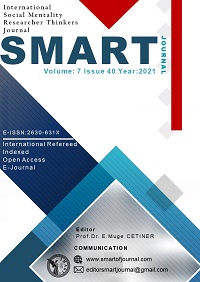VATANDAŞLARIN YASAMA ORGANI OLARAK TBMM (TÜRKİYE BÜYÜK MİLLET MECLİSİ)'NİN YASAMA SÜREÇLERİNE ELEKTRONİK YOLLARLA KATILMA İMKÂNLARININ ARAŞTIRILMASI VE YASAMA SÜREÇLERİNE DAHA AKTİF KATILIM İÇİN ÖNERİLER
Author :
Abstract
Günümüzde demokratik anayasal bilgi anlayışının tartışılmaz temel unsuru olarak kabul edilen ilke erkler ayrılığıdır ve bunlar yasama-yürütme-yargı olarak adlandırılır. Tabi ki yasama bir süreçtir. Sosyolojik bir ihtiyacın hayatın çeşitli alanlarında ortaya çıkmasıyla başlayan süreç ideal olarak tüm paydaşların görüşleri alındıktan sonra tasarı-taslak-kanunlaşma süreçlerinden geçer. Tüm paydaşların oluşum sürecindeki yasa hakkındaki görüşlerinin alınması çok büyük bir öneme sahiptir. Zira kanunlar özünde sosyolojik ve tarihsel süreçte ortaya çıkan ihtiyaçlara göre hazırlanır ve şekillenir. Vatandaşların bireysel katılımı ise bu ihtiyacın yasa metnine düzgün yansıtılması için büyük bir öneme sahiptir. Günümüzde bir yasa hazırlanma sürecinde o konunun uygulayıcısı durumundaki devlet kurumları çoğunlukla tasarı metnini bizzat hazırlayan olma durumundadır. Dolayısı ile kurumların görüş ve önerilerinin daha en başından alındığını söylemek yanlış olmaz. Öte yandan kısıtlı ve yetersiz bile olsa konunun paydaşı durumundaki STK’ların da görüş ve önerilerine başvurulduğu görülmektedir. Ancak vatandaşların bireysel olarak yasama süreçlerine katılımının çok rahat ve kolay olmadığı görülmektedir. Bireylerin Elektronik ortam ve usullerle yasama süreçlerine katılımının yolları ve önündeki engeller ile yapılması gerekenler bu makalede ele alınmıştır.
Keywords
Abstract
The principle accepted as the indisputable basic element of democratic constitutional understanding of knowledge today is the separation of powers and these are called as legislative-executive-judiciary. Of course, legislation is a process. The process that starts with the emergence of a sociological need in various areas of life, ideally passes through the draft-draft-enactment processes after the opinions of all stakeholders are received. It is of great importance that all stakeholders receive their views on the law in the formation process. In essence, laws are prepared and shaped according to the needs emerging in the sociological and historical process. Citizens' individual participation is of great importance for the proper reflection of this need in the text of the law. Nowadays, in the process of drafting a law, state institutions that are the enforcers of that issue are often required to prepare the text of the draft. Therefore, it would not be wrong to say that the opinions and suggestions of the institutions were taken from the very beginning. On the other hand, it is seen that the opinions and suggestions of NGOs, which are stakeholders of the issue, even if they are limited and inadequate, are consulted. However, it is observed that the participation of citizens individually in the legislative processes is not very comfortable and easy. In this article, the ways and obstacles to the participation of individuals in the legislative processes through electronic media and procedures, and what to do are discussed.





